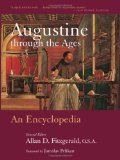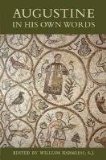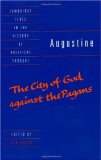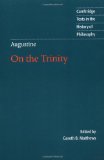|
Relevant
books
available at Amazon
Many Augustine
translations
and studies with links to Amazon
A selection below
 
Peter Brown biography
--------
 
Allan Fitzgerald --------
 
Henry Chadwick
a short indroduction --------
 
William Harmless.
Extracts from several of Augustine's main works --------
 
Henry Chadwick's translation of "Confessions" --------
 
R.W.Dyson's translation of "The City of God" --------
 
R.P.H. Green's translation of "On Christian Teaching" --------
 
Gareth Matthews' translation of "On The Trinity" (books 8 - 15) |
TO BONIFACE, MY NOBLE LORD AND JUSTLY DISTINGUISHED AND HONOURABLE SON,
AUGUSTIN SENDS GREETING IN THE LORD.
1. I had already written a reply to your Charity, but while I was waiting for an
opportunity of forwarding the letter, my beloved son Faustus arrived here on his
way to your Excellency. After he had received the letter which I had intended to
be carried by him to your Benevolence, he stated to me that you were very
desirous that I should write you something which might build you up unto the
eternal salvation of which you have hope in Christ Jesus our Lord. And, although
I was busily occupied at the time, he insisted, with an earnestness
corresponding to the love which, as you know, he bears to you, that I should do
this without delay. To meet his convenience, therefore, as he was in haste to
depart, I thought it better to write, though necessarily without much time for
reflection, rather than put off the gratification of your pious desire, my noble
lord and justly distinguished and honourable son.
2. All is contained in these brief sentences: “Love the Lord thy God with all
thy heart, and with all thy soul, and with all thy strength: and love thy
neighbour as thyself;” for these are the words in which the Lord, when on earth,
gave an epitome of religion, saying in the gospel, “On these two commandments
hang all the law and the prophets.” Daily advance, then, in this love, both by
praying and by well-doing, that through the help of Him, who enjoined it on you,
and whose gift it is, it may be nourished and increased, until, being perfected,
it render you perfect. “For this is the love which,” as the apostle says, “is
shed abroad in our hearts by the Holy Ghost, which is given unto us.” This is
“the fulfilling of the law;” this is the same love by which faith works, of
which he says again, “Neither circumcision availeth anything, nor uncircumcision;
but faith, which worketh by love.”
3. In this love, then, all our holy fathers, patriarchs, prophets, and apostles
pleased God. In this all true martyrs contended against the devil even to the
shedding of blood, and because in them it neither waxed cold nor failed, they
became conquerors. In this all true believers daily make progress, seeking to
acquire not an earthly kingdom, but the kingdom of heaven; not a temporal, but
an eternal inheritance; not gold and silver, but the incorruptible riches of the
angels; not the good things of this life, which are enjoyed with trembling, and
which no one can take with him when he dies, but the vision of God, whose grace
and power of imparting felicity transcend all beauty of form in bodies not only
on earth but also in heaven, transcend all spiritual loveliness in men, however
just and holy, transcend all the glory of the angels and powers of the world
above, transcend not only all that language can express, but all that thought
can imagine concerning Him. And let us not despair of the fulfilment of such a
great promise because it is exceeding great, but rather believe that we shall
receive it because He who has promised it is exceeding great, as the blessed
Apostle John says: “Now are we the sons of God; and it doth not yet appear what
we shall be: but we know that, when He shall appear, we shall be like Him; for
we shall see Him as He is.”
4. Do not think that it is impossible for any one to please God while engaged in
active military service. Among such persons was the holy David, to whom God gave
so great a testimony; among them also were many righteous men of that time;
among them was also that centurion who said to the Lord: “I am not worthy that
Thou shouldest come under my roof, but speak the word only, and my servant shall
be healed: for I am a man under authority, having soldiers under me: and I say
to this man, Go, and he goeth; and to another, Come, and he cometh; and to my
servant, Do this, and he doeth it;” and concerning whom the Lord said: “Verily,
I say unto you, I have not found so great faith, no, not in Israel.” Among them
was that Cornelius to whom an angel said: “Cornelius, thine alms are accepted,
and thy prayers are heard,” when he directed him to send to the blessed Apostle
Peter, and to hear from him what he ought to do, to which apostle he sent a
devout soldier, requesting him to come to him. Among them were also the soldiers
who, when they had come to be baptized by John,—the sacred forerunner of the
Lord, and the friend of the Bridegroom, of whom the Lord says: “Among them that
are born of women there hath not arisen a greater than John the Baptist,”—and
had inquired of him what they should do, received the answer, “Do violence to no
man, neither accuse any falsely; and be content with your wages.” Certainly he
did not prohibit them to serve as soldiers when he commanded them to be content
with their pay for the service.
5. They occupy indeed a higher place before God who, abandoning all these
secular employments, serve Him with the strictest chastity; but “every one,” as
the apostle says, “hath his proper gift of God, one after this manner, and
another after that.” Some, then, in praying for you, fight against your
invisible enemies; you, in fighting for them, contend against the barbarians,
their visible enemies. Would that one faith existed in all, for then there would
be less weary struggling, and the devil with his angels would be more easily
conquered; but since it is necessary in this life that the citizens of the
kingdom of heaven should be subjected to temptations among erring and impious
men, that they may be exercised, and “tried as gold in the furnace,” we ought
not before the appointed time to desire to live with those alone who are holy
and righteous, so that, by patience, we may deserve to receive this blessedness
in its proper time.
6. Think, then, of this first of all, when you are arming for the battle, that
even your bodily strength is a gift of God; for, considering this, you will not
employ the gift of God against God. For, when faith is pledged, it is to be kept
even with the enemy against whom the war is waged, how much more with the friend
for whom the battle is fought! Peace should be the object of your desire; war
should be waged only as a necessity, and waged only that God may by it deliver
men from the necessity and preserve them in peace. For peace is not sought in
order to the kindling of war, but war is waged in order that peace may be
obtained. Therefore, even in waging war, cherish the spirit of a peacemaker,
that, by conquering those whom you attack, you may lead them back to the
advantages of peace; for our Lord says: “Blessed are the peacemakers; for they
shall be called the children of God.” If, however, peace among men be so sweet
as procuring temporal safety, how much sweeter is that peace with God which
procures for men the eternal felicity of the angels! Let necessity, therefore,
and not your will, slay the enemy who fights against you. As violence is used
towards him who rebels and resists, so mercy is due to the vanquished or the
captive, especially in the case in which future troubling of the peace is not to
be feared.
7. Let the manner of your life be adorned by chastity, sobriety, and moderation;
for it is exceedingly disgraceful that lust should subdue him whom man finds
invincible, and that wine should overpower him whom the sword assails in vain.
As to worldly riches, if you do not possess them, let them not be sought after
on earth by doing evil; and if you possess them, let them by good works be laid
up in heaven. The manly and Christian spirit ought neither to be elated by the
accession, nor crushed by the loss of this world’s treasures. Let us rather
think of what the Lord says: “Where your treasure is, there will your heart be
also;” and certainly, when we hear the exhortation to lift up our hearts, it is
our duty to give unfeignedly the response which you know that we are accustomed
to give.
8. In these things, indeed, I know that you are very careful, and the good
report which I hear of you fills me with great delight, and moves me to
congratulate you on account of it in the Lord. This letter, therefore, may serve
rather as a mirror in which you may see what you are, than as a directory from
which to learn what you ought to be: nevertheless, whatever you may discover,
either from this letter or from the Holy Scriptures, to be still wanting to you
in regard to a holy life, persevere in urgently seeking it both by effort and by
prayer; and for the things which you have, give thanks to God as the Fountain of
goodness, whence you have received them; in every good action let the glory be
given to God, and humility be exercised by you, for, as it is written, “Every
good gift and every perfect gift is from above, and cometh down from the Father
of lights.” But however much you may advance in the love of God and of your
neighbour, and in true piety, do not imagine, as long as you are in this life,
that you are without sin, for concerning this we read in Holy Scripture: “Is not
the life of man upon earth a life of temptation?” Wherefore, since always, as
long as you are in this body, it is necessary for you to say in prayer, as the
Lord taught us: “Forgive us our debts, as we forgive our debtors,” remember
quickly to forgive, if any one shall do you wrong and shall ask pardon from you,
that you may be able to pray sincerely, and may prevail in seeking pardon for
your own sins. These things, my beloved friend, I have written to you in haste,
as the anxiety of the bearer to depart urged me not to detain him; but I thank
God that I have in some measure complied with your pious wish. May the mercy of
God ever protect you, my noble lord and justly distinguished son.
|

